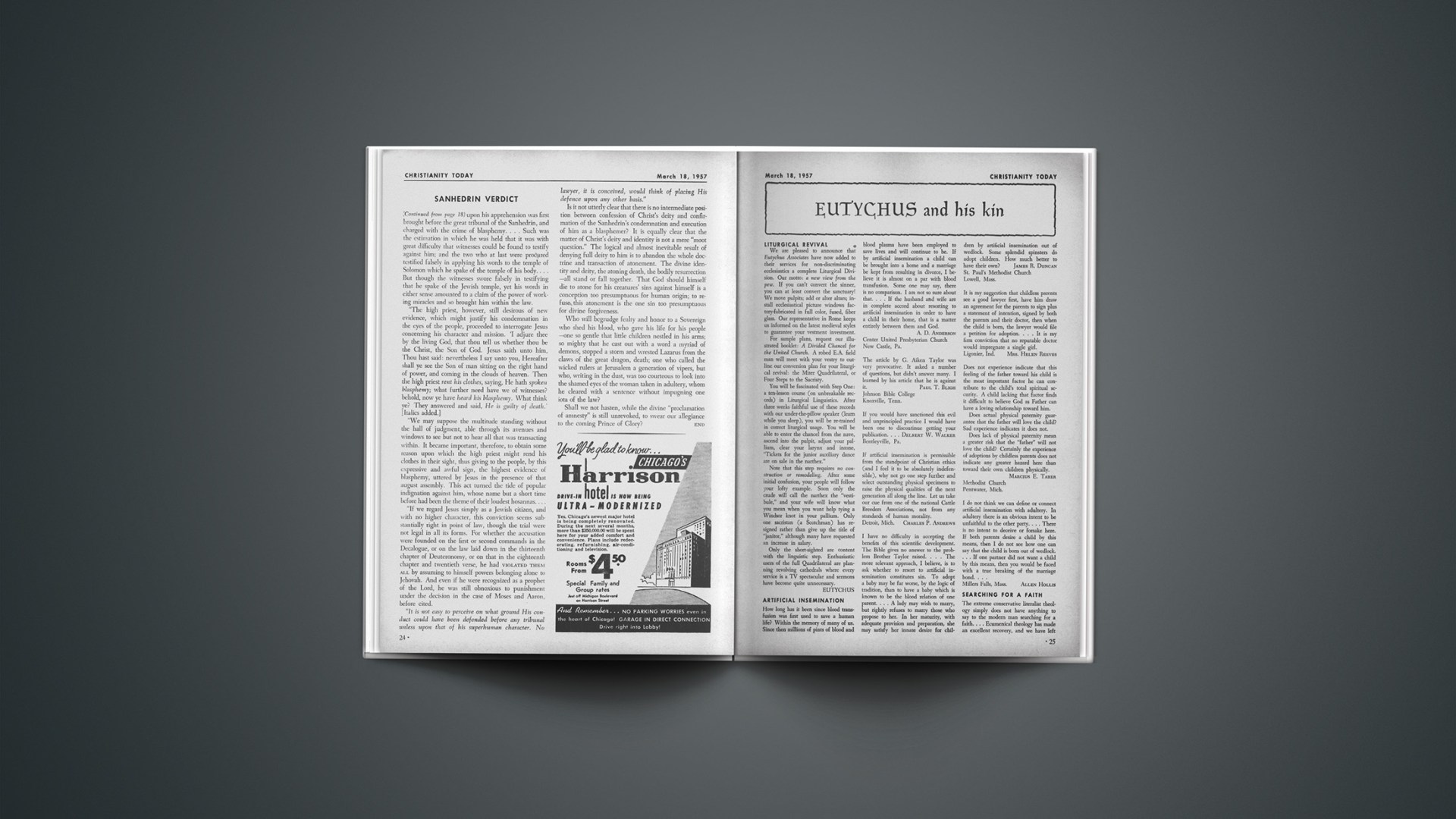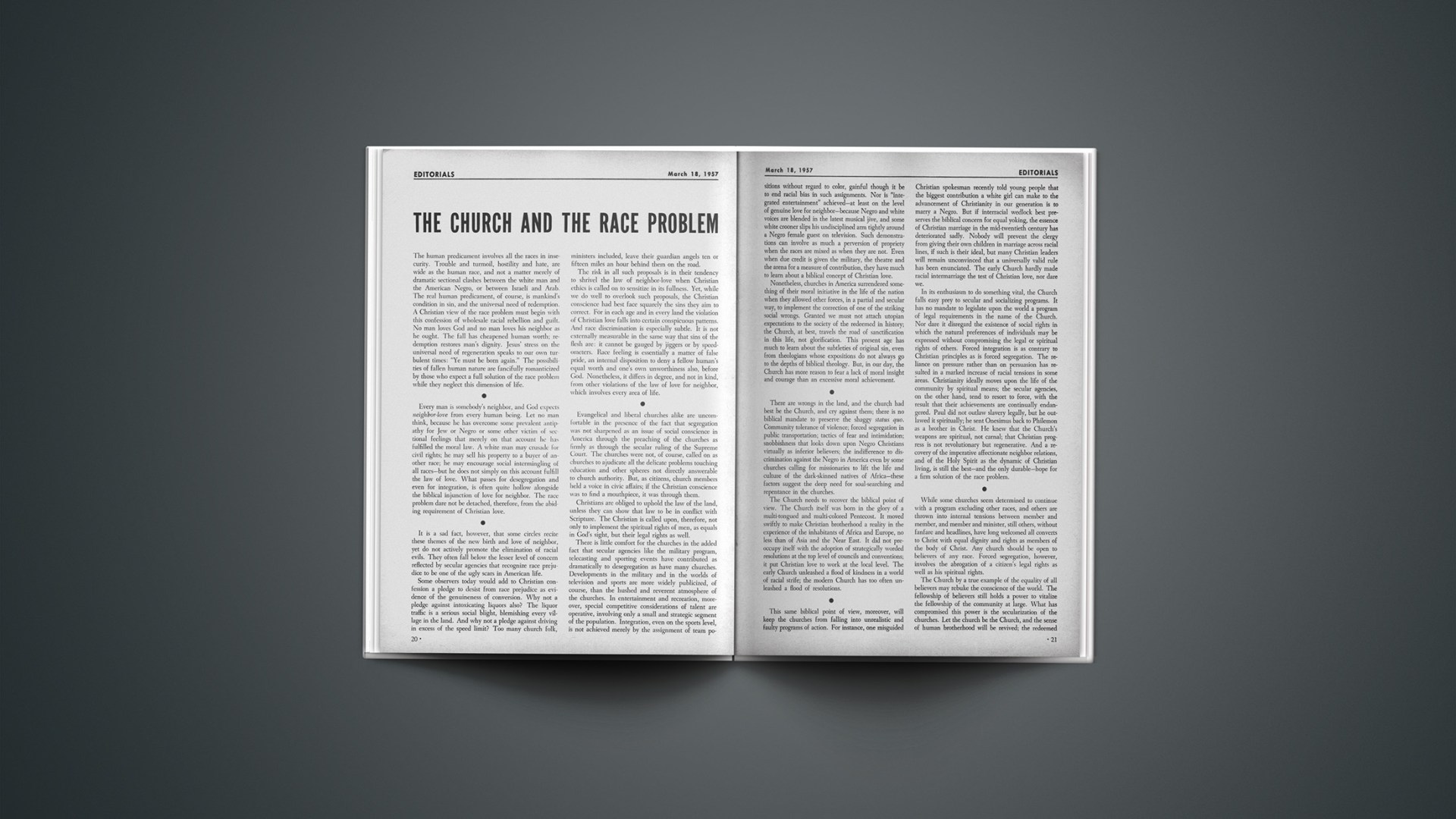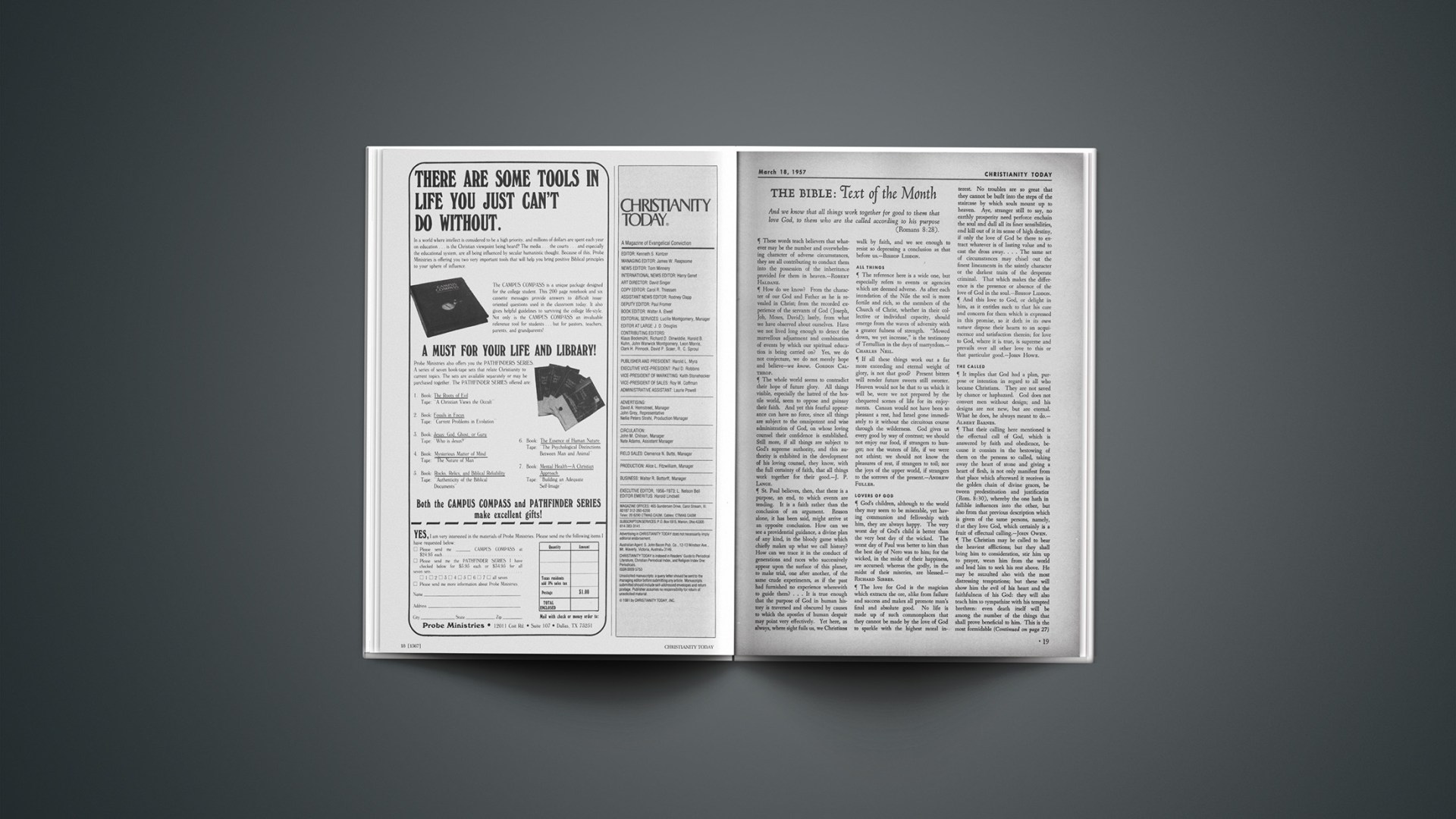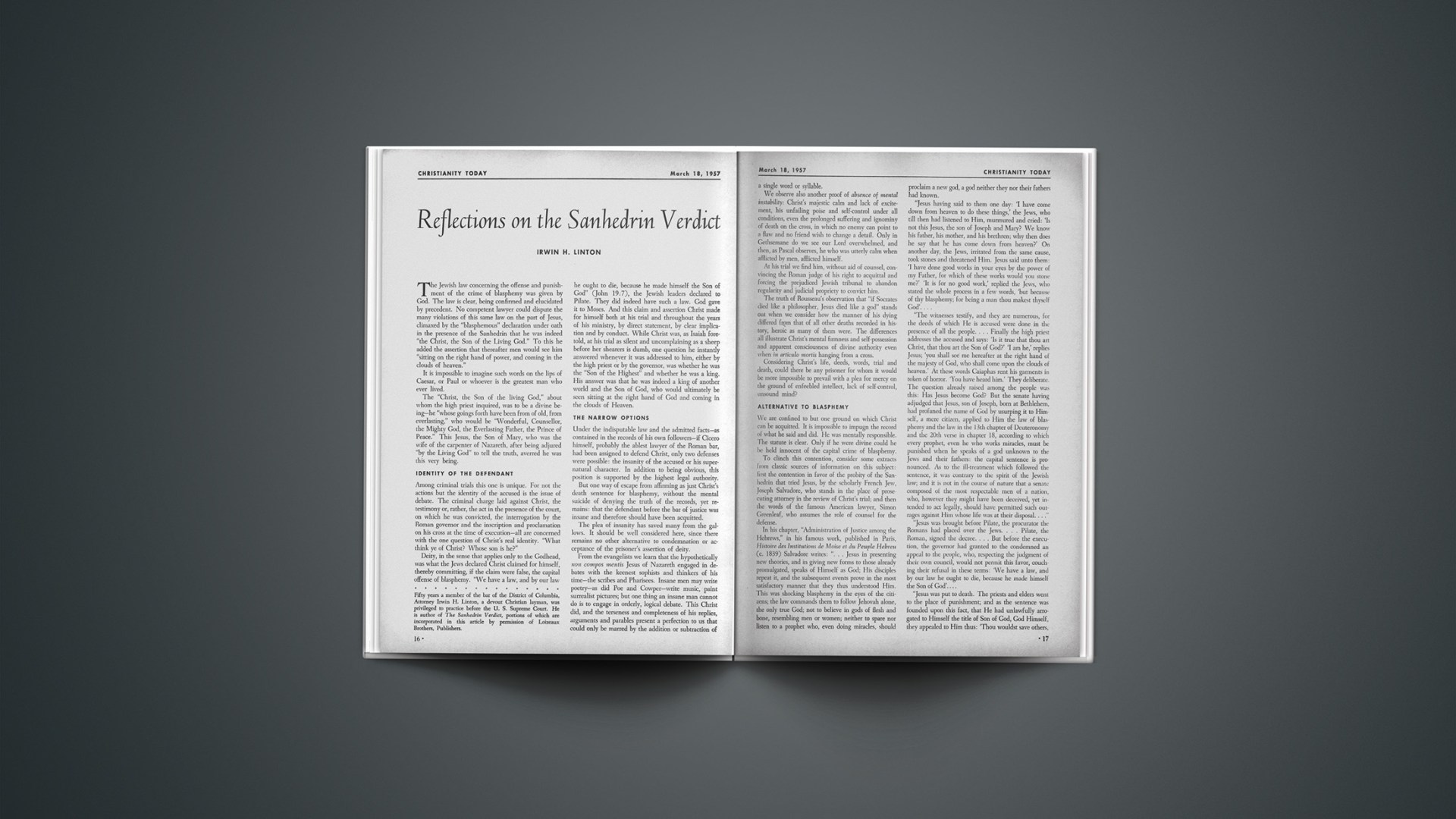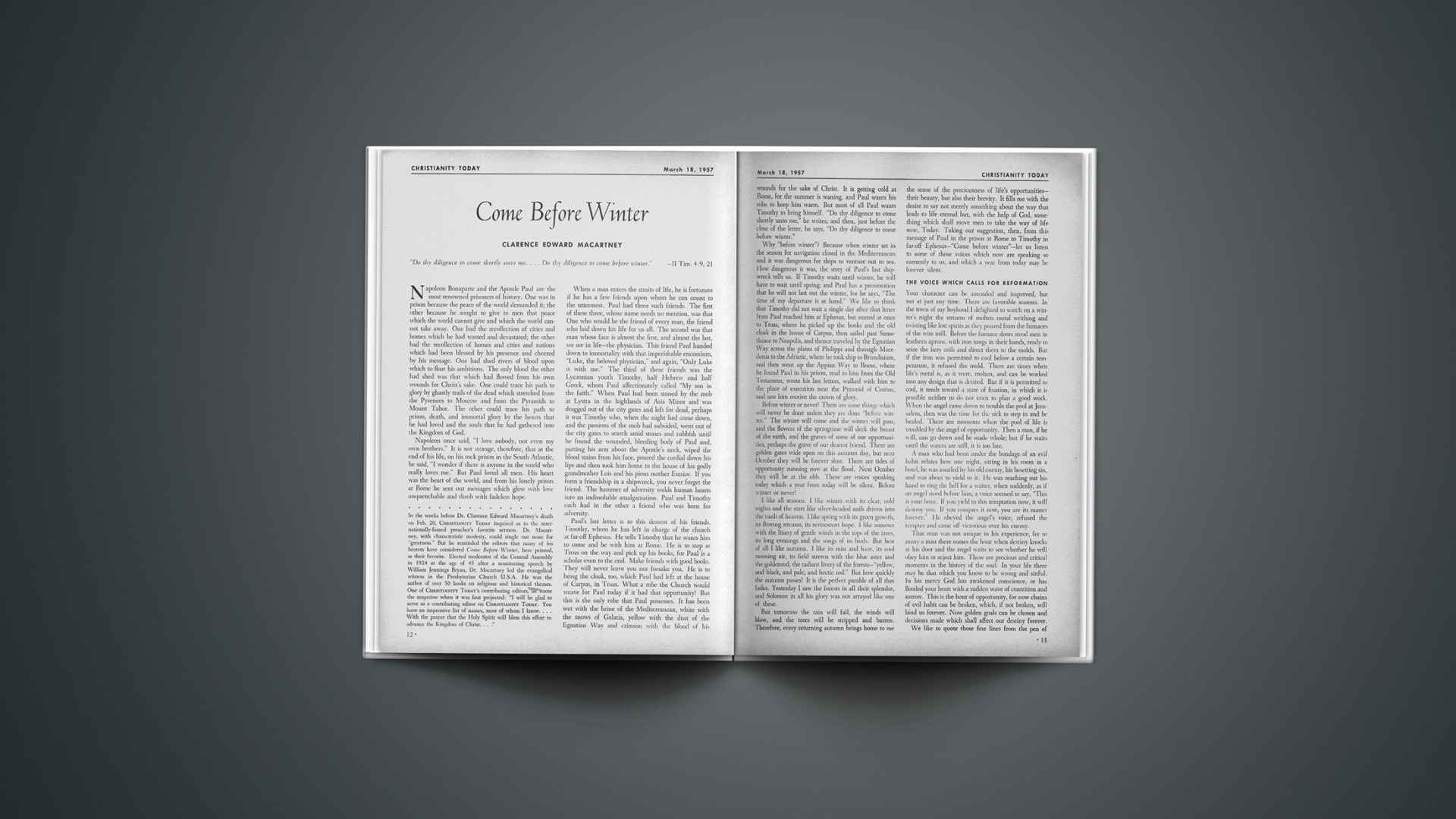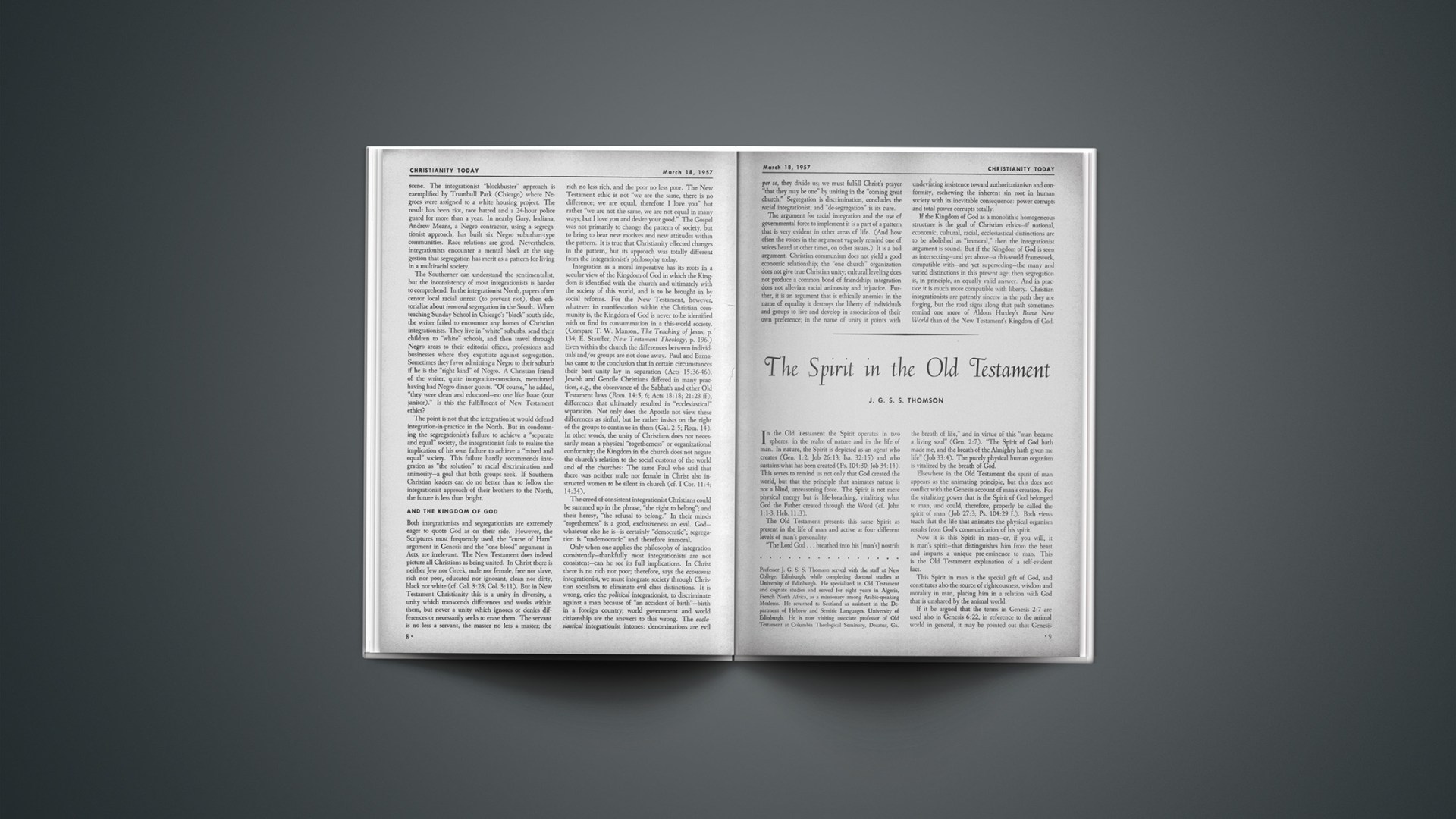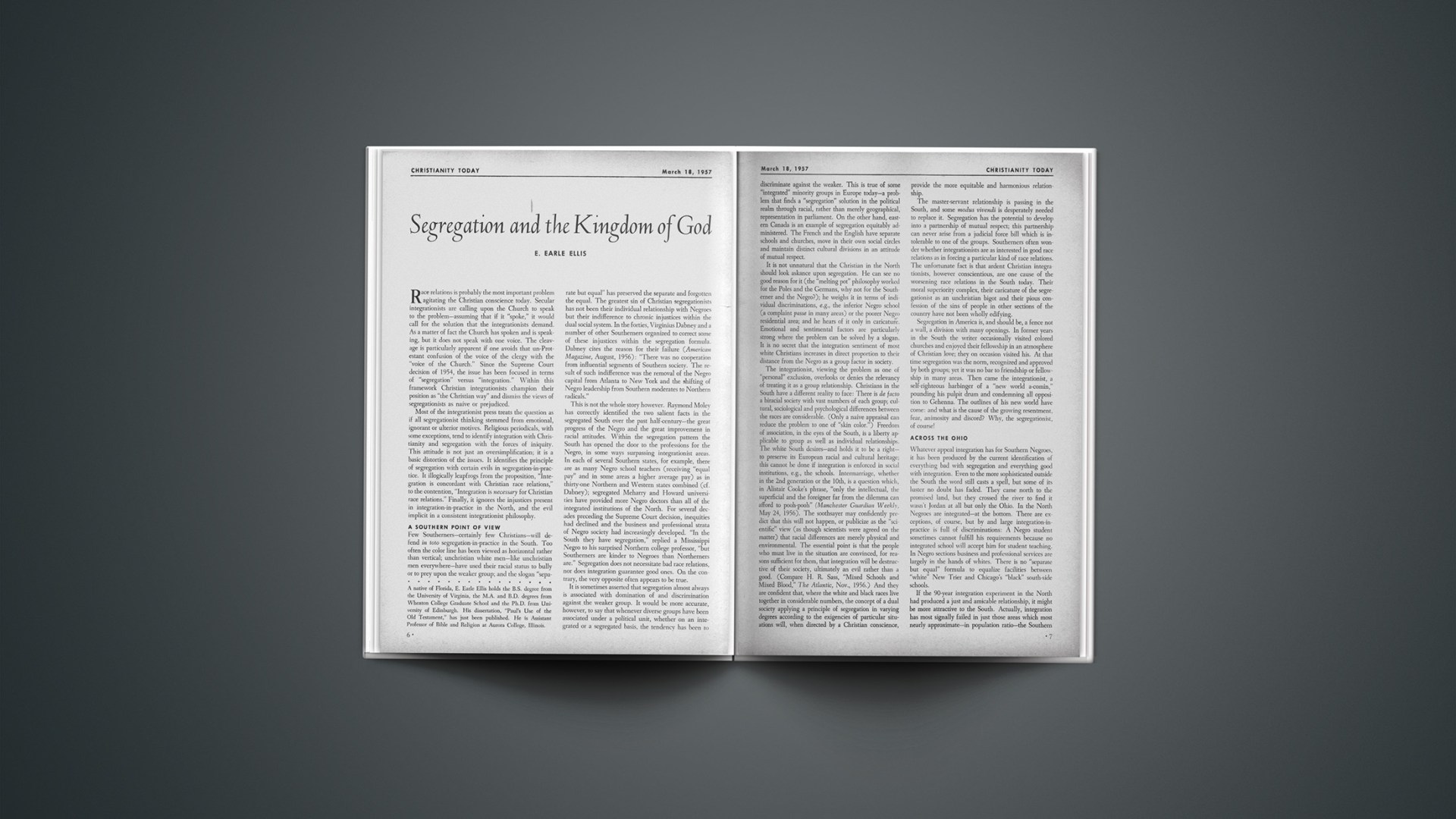LITURGICAL REVIVAL
We are pleased to announce that Eutychus Associates have now added to their services for non-discriminating ecclesiastics a complete Liturgical Division. Our motto: a new view from the pew. If you can’t convert the sinner, you can at least convert the sanctuary! We move pulpits; add or alter altars; install ecclesiastical picture windows factory-fabricated in full color, fused, fiber glass. Our representative in Rome keeps us informed on the latest medieval styles to guarantee your vestment investment.
For sample plans, request our illustrated booklet: A Divided Chancel for the United Church. A robed E.A. field man will meet with your vestry to outline our conversion plan for your liturgical revival: the Miter Quadrilateral, or Four Steps to the Sacristy.
You will be fascinated with Step One: a ten-lesson course (on unbreakable records) in Liturgical Linguistics. After three weeks faithful use of these records with our under-the-pillow speaker (learn while you sleep), you will be re-trained in correct liturgical usage. You will be able to enter the chancel from the nave, ascend into the pulpit, adjust your pallium, clear your larynx and intone, “Tickets for the junior auxiliary dance are on sale in the narthex.”
Note that this step requires no construction or remodeling. After some initial confusion, your people will follow your lofty example. Soon only the crude will call the narthex the “vestibule,” and your wife will know what you mean when you want help tying a Windsor knot in your pallium. Only one sacristan (a Scotchman) has resigned rather than give up the title of “janitor,” although many have requested an increase in salary.
Only the short-sighted are content with the linguistic step. Enthusiastic users of the full Quadrilateral are planning revolving cathedrals where every service is a TV spectacular and sermons have become quite unnecessary.
EUTYCHUS
ARTIFICIAL INSEMINATION
How long has it been since blood transfusion was first used to save a human life? Within the memory of many of us. Since then millions of pints of blood and blood plasma have been employed to save lives and will continue to be. If by artificial insemination a child can be brought into a home and a marriage be kept from resulting in divorce, I believe it is almost on a par with blood transfusion. Some one may say, there is no comparison. I am not so sure about that.… If the husband and wife are in complete accord about resorting to artificial insemination in order to have a child in their home, that is a matter entirely between them and God.
A. D. ANDERSON
Center United Presbyterian Church
New Castle, Pa.
The article by G. Aiken Taylor was very provocative. It asked a number of questions, but didn’t answer many. I learned by his article that he is against it.
PAUL T. BLIGH
Johnson Bible College
Knoxville, Tenn.
If you would have sanctioned this evil and unprincipled practice I would have been one to discontinue getting your publication.…
DELBERT W. WALKER
Bentleyville, Pa.
If artificial insemination is permissible from the standpoint of Christian ethics (and I feel it to be absolutely indefensible), why not go one step further and select outstanding physical specimens to raise the physical qualities of the next generation all along the line. Let us take our cue from one of the national Cattle Breeders Associations, not from any standards of human morality.
CHARLES P. ANDREWS
Detroit, Mich.
I have no difficulty in accepting the benefits of this scientific development. The Bible gives no answer to the problem Brother Taylor raised.… The more relevant approach, I believe, is to ask whether to resort to artificial insemination constitutes sin. To adopt a baby may be far worse, by the logic of tradition, than to have a baby which is known to be the blood relation of one parent.… A lady may wish to marry, but rightly refuses to marry those who propose to her. In her maturity, with adequate provision and preparation, she may satisfy her innate desire for children by artificial insemination out of wedlock. Some splendid spinsters do adopt children. How much better to have their own?
JAMES R. DUNCAN
St. Paul’s Methodist Church
Lowell, Mass.
It is my suggestion that childless parents see a good lawyer first, have him draw an agreement for the parents to sign plus a statement of intention, signed by both the parents and their doctor, then when the child is born, the lawyer would file a petition for adoption.… It is my firm conviction that no reputable doctor would impregnate a single girl.
MRS. HELEN REEVES
Ligonier, Ind.
Does not experience indicate that this feeling of the father toward his child is the most important factor he can contribute to the child’s total spiritual security. A child lacking that factor finds it difficult to believe God as Father can have a loving relationship toward him.
Does actual physical paternity guarantee that the father will love the child? Sad experience indicates it does not.
Does lack of physical paternity mean a greater risk that the “father” will not love the child? Certainly the experience of adoptions by childless parents does not indicate any greater hazard here than toward their own children physically.
MARCIUS E. TABER
Methodist Church
Pentwater, Mich.
I do not think we can define or connect artificial insemination with adultery. In adultery there is an obvious intent to be unfaithful to the other party.… There is no intent to deceive or forsake here. If both parents desire a child by this means, then I do not see how one can say that the child is born out of wedlock.… If one partner did not want a child by this means, then you would be faced with a true breaking of the marriage bond.…
ALLEN HOLLIS
Millers Falls, Mass.
SEARCHING FOR A FAITH
The extreme conservative literalist theology simply does not have anything to say to the modern man searching for a faith.… Ecumenical theology has made an excellent recovery, and we have left doth that extreme liberalism and your extreme conservatism far behind.…
CHARLES M. KNAPP
Almira Community Church
Almira, Wash.
As an Anglo-Catholic … I approached your paper with grave suspicions. I thought it might be scholarly; but, as with other Protestantism I had known, I thought it would be Satan’s instrument toward division and even self-destruction. But slowly—very slowly, because of prejudice on my part—I was forced to admit that it has values to offer which are not present in Catholicism (whether Anglican or Roman).… You stand for matters (knowledge of the Bible and definiteness of conversion) that might very well be found within the Catholic Faith (Anglican or Roman). And so I’ve been forced to conclude that I should have your paper. Here, then, is my subscription.…
CHARLES H. HARRISON
Society of St. Theresa
New York City
I am sorry to read … that the vicar of Hornsey is too catholic and too English to “see foreign protestant literature.” To a true catholic, as for the scholar, of course, nothing is “foreign”.… It is possible to be both catholic and protestant at the same time. For the commonly accepted meaning of protestant here is that one rejects the papal claim to have divinely given jurisdiction over all Christendom, and this we claim was never part of the original catholic faith.… To be truly catholic one must be protestant.
T. A. COULSON
St. Matthias’ Church
Torquay, Devon, England
I want to say how much I appreciate CHRISTIANITY TODAY. Of course there are many points in it with which I disagree; it would be dull reading if it were otherwise. But it is most important for us of the Church of England to keep in mind the trend of Protestant thought abroad or we shall get narrow minded; and after all we are Protestant in doctrine.
A. H. A. EMPSON
Ministerley, Shropshire, England
I don’t know how many of our isolated and impecunious country clergy are the fortunate recipients of your admirable magazine, but I would like you to know that I am one who is most grateful.… It lasts me a fortnight.
I am the more impelled to let you know this, by what I thought a most ungracious letter from a London Vicar. As a monastery-trained Anglican priest, I daresay I may have forgotten more of our version of Catholicism than he will ever learn, but when our Church Times prints an article by a leading Bishop, denying … eternal punishment and follows up with letters in approval, I say, thank God for CHRISTIANITY TODAY, by which American Protestantism safeguards for the world the sound, orthodox, Gospel truths without which we cannot be saved.
J. F. E. MORTON
Downholme Vicarage
Richmond, Yorkshire, England
NOTHING TO FEAR
Although I eschew the doctrines of the substitutionary atonement and the plenary inspiration of the Bible—at least as these doctrines are usually put forward—I am forced to wholeheartedly congratulate you on your publication. It is a much needed contribution to the field of Christian journalism, presenting a responsible, forthright, conservative point of view. I have read all of your issues so far, with profit, though with much disagreement.
I think that Mr. Yeaman’s letter to Gordon Clark entirely misses the point—the Virgin Birth cannot be disproved by scholarship, Bultmann’s or any other. The fact that it is in a pericope is not point, for so is the kerygma. The statement that it is in a less important pericope shows Mr. Yeaman’s theological bias, and not his scholarship.
All this granted, however, I think that Mr. Clark’s reply also misses the point. His enclosure of the word “discoveries” in quotes is also an expression of theological commitment and not of scholarship. As a matter of fact, there are various levels of certainty derived from historical scholarship.… When Mr. Clark dismisses the results of scholarship with a set of quotation marks, and the blithe statement that “Orthodox Christians have always known that this scholarship was mistaken,” he shows a closure of mind which befits neither a conservative nor a “modernist”.… Orthodoxy has nothing to fear from scholarship, for it rests in divine hands and is enriched, not impoverished by prayerful research and study. If it is destroyed by that study it cannot claim to be orthodoxy.
JERRY HANDSPICKER
Yale Divinity School
New Haven, Conn.
Professor Handspicker holds that I missed the point in my reply to Mr. Yeaman and insists that I should either prove the historical existence of the Hittites or keep quiet about the fact that orthodoxy has always accepted them as historical.
First, I disclaim any such obligation in a short reply to Mr. Yeaman. It seems to me legitimate to assume that the historicity of the Hittites is commonly acknowledged today. The evidence, on display in the Oriental Institute, cannot be put in this column.
Second, Mr. Yeaman assumed that a certain discovery settled the unimportance of the Virgin Birth; and his argument presupposes that the acceptance of discoveries is an intellectual obligation. I put the word discoveries in quotation marks to suggest that the alleged discoveries of scholars (in the past hundred years) often have been false conclusions. Professor Handspicker takes my quotation marks as evidence of shut eyes and a closed mind. On the contrary I have with open eyes seen clearly these nineteenth century blunders.
Third, when Professor Handspicker asserts that both Mr. Yeaman and I, at a certain point, express our theological commitment and not our scholarship, he makes a disjunction which, though common, is in my opinion faulty. The conclusions of scholarship are invariably related to the scholar’s theology. This is the reason, I believe, why the existence of the Hittites was denied.
Now, finally, if my faith were based on the changing opinions of scholars, then indeed it would have a shaky foundation. Since Professor Handspicker does not tell us what foundation he would identify as a rock, it would be inappropriate to embark on further speculation here, for I judge that he and I would not agree as to what the criterion of truth is. But can anyone doubt that the orthodox acceptance of the Hittites was correct and that the scholarly discoveries were false?
GORDON H. CLARK
Butler University
Indianapolis, Ind.
UNITED NATIONS DISUNITY
The spate of cynical lying and misrepresentation put forth by the Communist bloc and the so-called anti-colonial Afro-Asian group, Nehru’s lofty moralizing (though Pakistan now accuses him of colonialism and he does not implement U.N. decisions that he does not like) while accepting Russia’s statistics on Hungary and rejecting British statistics on Port Said, the utter cynicism of Russia’s use of the U.N. as a pawn in the cold war to be ignored when it suits her convenience, the fact pointed out by Professor Gilbert Murray that the voting strength of the U.N. is now so disposed that it can be used, and will be used unless stopped, to undermine the strength of Western culture and civilization by nations whose governments are not by our standards more than semi-civilized; all this makes it clear that the U.N. cannot take a genuine stand as a genuine whole.… The ineffectiveness of the U.N. was one of the causes of independent action by Israel first, and then by Britain and France. The U.N. will only oscillate in our lifetime between being an opportunity for international education and a platform for the cold war.…
H. GUNTRIP
Department of Psychiatry
Leeds University
Leeds, England
The lack in interest concerning observance of human rights is because, since the organization of the U.N., millions of people, starting with the Baltic States and the Balkans, have been denied all of their human rights by Russia.… Has the U.N. taken any steps to give rights to these people? Even after the Hungarian slaughter and the admission of Stalin’s crimes, Russia remains in the U.N. in spite of her numerous violations of the charter.…
RUTH S. PORTER
St. Petersburg, Fla.
VERY LIBERAL
I am very liberal in my thinking, save in a few profound religious truths.… But one thing is amazing—the unkind criticisms … from ministers of the gentle Christ.
In one recent issue a writer affirmed, at least by inference, that he knew the difference between theological positions before he was three. Jesus debated with the Doctors much later than that.… Bobby Burns wrote of these seminary boys:
A set of dull conceited hashes
Confuse their brains in College classes
They gang in kirks, but come out asses
Plain truth to speak.
JETHRO COBB
New Orleans, La.
CHRISTIAN FOREIGN POLICY
… Mr. Dulles’s statements have implied, and all but stated, that force is wrong in every case; that the only way of settling international disputes is by negotiation.… If the use of force is intrinsically wrong, we wonder why the United States maintains the world’s most powerful armaments? The answer is … they are necessary to safeguard the nation against those who … threaten the nation’s existence.… It is a case of determining at what point the use of force becomes necessary. Mr. Dulles has—so far as this Englishman knows—never admitted that the use of force might ever have been justified. But is he right in this?…
What has especially disappointed some of us is the failure of American evangelicals to question Dulles’s policies. To us, knowing his liberal Christian background, his policies have seemed an expression of emasculated Christianity at its worst.…
A. MORGAN DERHAM
Chenies, Rickmansworth
Herts, England
COMMENT AND COMPLAINT
I feel moved to write on behalf of the thousands of future preachers in seminaries who receive your final journal.… It is doing a lot to keep us true to the Lord Jesus Christ and the faith once for all delivered to the saints. And it is a clear indication that to be an evangelical is to be free, to be a scholar, in the fullest sense.…
RICHARD L. HEIM
Maywood, Ill.
I am a Priest of the Catholic Church in the Anglican Communion. It is astonishing that you are ignorant of the fact that the Catholic Church has no affinity with Pan-Protestantism.… Thank God for the Catholic faith which cannot be soiled or warped by the crass bickerings of Protestants.
M. V. MARRACOTT
Port Maria, Jamaica
I am not overstating my estimate, when I use the term peerless.
F. R. JENKINS
Central Kans. Meth. Conf.
Goncordia Dist., Clifton, Kans.

